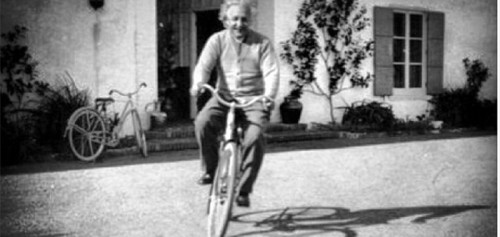As a 76-year-old, I am totally aware of the age-related declines in my body. For starters, I don’t hear so well, I need bigger print to read comfortably and my hair gets thinner by the day. The list goes on…
When I was younger, I didn’t pay much attention to age-related changes going on. Probably because I was having too much fun.
But, it turns out that the aging decline starts much earlier than we are aware.

Einstein enjoyed his bike riding for many years
The Wall Street Journal says, “Age-related hearing starts going downhill at 25, though it isn’t noticeable until decades later. We start losing bone mass as early as our 30s. And a recent study by Duke University researchers found that some types of physical decline—particularly lower-body strength and balance—often begin in the 50s.”
As I have repeated numerous times, my family tree includes Alzheimer’s Disease and other dementia.
The Journal says, “When it comes to cognitive decline, there is a gradual loss of different functions. Speed of processing and working memory peak in the 20s and gradually start declining.
“Learning new information after 40 can be harder, says Kathy Wild, an associate professor of neurology and psychiatry at Oregon Health and Science University in Portland, Oregon. Tasks that require concentration should be done with minimal interruptions or distractions, she says.”
I know that the sounds of our industrial environment have much to do with the decline in our hearing range. “High-pitched sounds are first to go. Our hearing is best between ages 18 and 25, says Ian Windmill, clinical director of audiology at Cincinnati Children’s Hospital Medical Center. “It actually starts going down after that, but it’s so slow, so you don’t notice it for many years.”
“The medical term for age-related hearing loss is presbycusis.
“It usually becomes noticeable around age 50, he says.”
“The combination of muscle and bone loss becomes a real problem when people reach their 60s and 70s, which is why maintaining muscle strength when in your 40s and 50s is so important.” (emphasis mine)
Check out my recent post on sarcopenia for much more detail on muscle strength and deterioration .
Tony








Eat clean, keep moving and strength trg.
This will help to slow things down at least..
LikeLiked by 1 person
Such an important article to write about. The good news is we don’t have to sit around and wait for the “inevitable.” We can participate in LIFE and slow down the degenerative process SIGNIFICANTLY in many cases. When we read statistics, we must realize they are based on average people that DO NOT live lifestyles that promote healthy living. It makes sense that PASSIVE living will accelerate the aging process in a NEGATIVE manner. For those (such as yourself) that have taken personal responsibility for living an ACTIVE functional lifestyle, there is a greater chance of achieving a longer quality of life. Keep showing the rest of the world that AGING is simply part of a healthy and happy journey; NOT simply the determining factor causing isolation, depression and loss of function!
LikeLiked by 1 person
Thanks, Jonathan. Excellent point about the averages’ composition. Each of us has it in his power to outstrip the averages.
LikeLiked by 1 person
You, my friend, are accomplishing it!
LikeLike